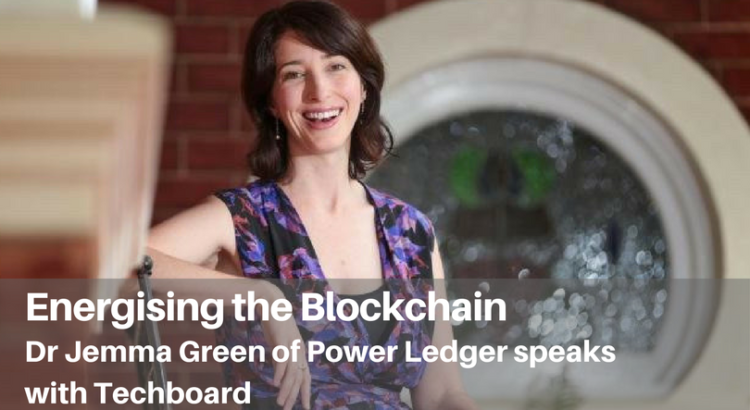In August this year, Power Ledger grasped everyone’s attention by raising $17 million in its the pre-sale of its Token Generation Event (TGE) or Initial Coin Offering (ICO) ahead of raising a total of $34million in its ICO which closed in October. For most of us, this raised a lot of questions… “What is an ICO? Why would someone want raise money using an ICO? And what’s a POWR token?” Fortunately, our Contributor Matthew Parker from MitchelLake was able to sit down with Dr Jemma Green, co-founder and Chair of Power Ledger to help us answer these questions. Power Ledger first came to prominence in Techboard’s Rankings back in August 2016 where it topped the ranking for 2 fortnights. This year PowerLedger topped the Techboard Ranking in August and has remained in the top five in September and October.
In addition to a decorated career at JP Morgan, 3 post graduate degrees from Cambridge and a PHD from Curtin University, she is the Acting Lord Mayor of the City of Perth, the Chair of Climate-KIC Australia and is also on the board for the Western Australian water utility, the Water Corporation. Jemma, in many ways, wrote the book on how to use disruptive technologies to forward society. Her most recent research into citizen utilities and the future of energy lead her to co-found Power Ledger in 2016.
Matthew Parker (MP): What is your vision for the energy industry in the future?
Dr Jemma Green (JG): The inconvenient truth facing the energy supply industry is that, at some stage, it will be cheaper and more effective to self-supply than to rely on the network to provide low-cost, reliable and clean energy. However, we believe that the value of network assets can be preserved rather than becoming obsolete.
Our vision is one of a power system that is resilient, low-cost, zero-carbon and owned by the people of the world. One part of this is de-risking investments in renewable energy assets but the other part is reimagining the network as a decentralized and trustless trading platform.
The future we envisage is one of a highly resilient network of millions of energy producing micro-investments that can generate and trade energy quickly, securely and cheaply.
MP: So what is Power Ledger’s role in enabling us to reach that future state?
JG: Right now, we’re beginning to action all of the plans in our company roadmap. The peer-to-peer application is live, however we are working to expand the Platform further. The first new applications to go into beta testing are the microgrid/embedded network operator/strata and the electric vehicle trading applications. At the same time, we’ll begin the green energy rewards program to accelerate renewable energy generation.
Within the next year, we’ll also begin conducting our asset germination events, which give POWR token holders the opportunity to co-own or benefit from renewable assets.
The real world manifestations of our development roadmap can be seen in the partnership trials we have begun. In Australia, Origin Energy are using the Power Ledger platform to let customers buy and sell excess energy, while we’ve just been granted part of A$8.26million to develop a renewable energy generation and storage in the City of Fremantle. In India, we are working with Tech Mahindra to use the Power Ledger trading platform in conjunction with microgrids at sites across the country.
All of these trials follow the same pattern of testing and learning as previous ones and that’s the approach we’ll continue to take as we build towards our vision of a future energy industry.
MP: The ICO created a lot of buzz in Australia and the world, how did you decide to go down the ICO route and had you ever contemplated raising capital from more traditional sources?
JG: Although we are an energy company first and foremost, we discovered blockchain because it was the best solution for enabling secure, fast and low-cost transactions in our trading market. Once we’d embraced blockchain as the technology solution, we realized an ecosystem, fueled by a token, would make our technology interoperable across applications.
Token holders create a network which gives the Platform value, and in return, they receive ownership of the network. Early users get more ownership and there is potential for that ownership to be worth more in the future.
Using a token model, there is now an incentive to be an early adopter or user of the network. In Power Ledger’s case, it allows future users of the Platform to pre-purchase electricity at a discounted rate, as demand drivers may increase the value of POWR. By holding a Token Generation Event (ICO), anyone who wanted to be apart of the ecosystem could get POWR tokens directly from Power Ledger to use once the ecosystem is further developed.
MP: It was noted in almost every write-up of the event (including ours) that this is Australia’s first ever ICO/TGE, why did you decide to do this here?
JG: We chose to set the standard for comprehensive terms and conditions and disclosure documents in Australia, and we did this because we believe token sales can be used an incentive model for emerging innovative companies to grow, rather than a funding model whereby tokens only have speculative values and no utility.
As there are swarms of ICOs happening this year, we looked to previous ICOs for best and worst practices to determine how we wanted ours to look. The first thing we prioritized was accountability and transparency, as this had been lacking in other examples we looked at. For that reason, we did our ICO under our corporate entity, rather than an offshore foundation with figureheads as board members. It was important from day one to establish trust with our token holders and assume responsibility as a board, and we believe this is why we have such a strong community today.
MP: Do you have a sense of what sort of proportion of the people who bought POWR tokens will become potential purchasers of power from Power Ledger as opposed to investors/speculators?
JG: There is really no ability to measure the breakdown of potential users to speculative buyers, and some buyers could be both. We set up the TGE to disincentivize speculators in anyway that we could. Other ICOs have caps on the amount of funds they will accept, which we have seen causes speculative investors to buy all the tokens and sell them on the market at premiums to actual platform users. In our case, anyone who wanted to get POWR tokens could. By having an uncapped token sale, large speculative investors (known as whales in the crypto community) were disincentivized to buy as the larger their bag the more diluted the price became. We were also careful in our marketing materials to not target speculators, we posted content about our energy future to target those following our vision.
MP: What were some of the key challenges you faced in bringing the first ICO/TGE to the Australian market?
JG: One of the biggest hurdles was education, it’s one thing to explain how our platform utilizes blockchain technology and another entirely to explain how token dynamics create an incentive model that grows the platform. The first big media piece we were featured in describe the ICO as a ‘Bitcoin IPO’, which wasn’t accurate but it did explain it to newbies much better than an ‘Initial Coin Offering’.
Another barrier we faced was awareness. We didn’t have the luxury of popping over to another country to present at a conference or go to a meetup every other week. Traveling from Perth to New York wasn’t realistic when running on the lean budget Power Ledger has. In the end, we broke through the noise by getting recognized by some highly regarded media outlets and influencers in the space. Though our marketing budget was slim, our product spoke for itself and the response was humbling and motivating.
MP: Do you have any pointers for other Australian companies contemplating an ICO/TGE?
JG: Yes, quite a few! Firstly, they should not get involved in an ICO thinking that they can just publish a whitepaper and buyers will come. Interested parties are putting much more scrutiny on the projects they get involved in. Companies should not look at ICOs as a way to raise capital for less cost and commitment but rather they should go down the ICO route if there is a clear need for a token to address the issue their platform solves. Many token buyers no longer look at an ICO without a live product or at least open sourced code on Github.
Being open and transparent about your team and why you’ve been brought together at this time to fix a market problem has to part of the information you provide, as it’s the best way to dispel any fears that you might do a vanishing act. As mentioned, one of the best things we did to reassure participants was attaching our ICO to a country jurisdiction and I’d advise others to go through the legal processes that would normally be associated with fundraising, in order to prove you have nothing to hide.
View Power Ledger’s Techboard Profile (along with Traction data)
See Techboard Interviews:

Matthew Parker is a Senior Consultant at MitchelLake Group in Sydney. Matthew connects great people, with great stories, with great businesses.

Dr. Jemma Green is the Chair and a Co-founder of PowerLedger.io, a leading full stack energy blockchain technology company. She is a Research Fellow at Curtin University in Western Australia, where she completed her PhD in disruptive innovation looking at electricity markets. Prior to that Jemma worked in investment banking in London for over a decade, most of which was spent at J.P. Morgan. While in the UK she received a Masters degree and two postgraduate diplomas from Cambridge University in sustainability.
Dr. Jemma Green is an author, researcher and entrepreneur on the enterprise disruption caused by blockchain technology, with special expertise on energy and the sustainable economy. Jemma’s research on ‘Citizen Utilities’ and the emerging power paradigm, as well as her entrepreneurial passion, led her in May of 2016, to Co-found Power Ledger, a world leading energy blockchain company that enables P2P electricity trading and fractionalization of ownership of energy assets.




